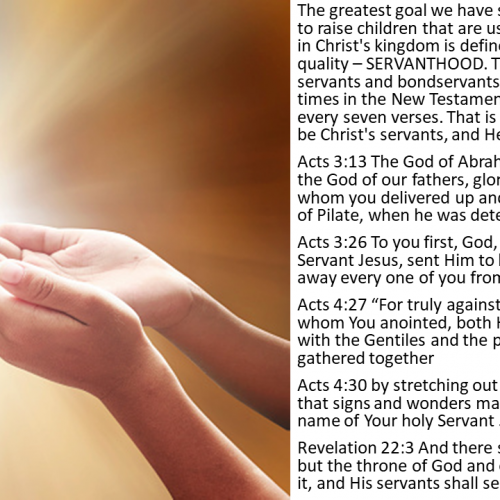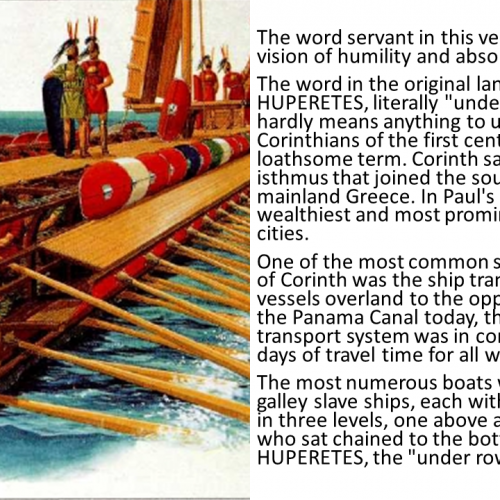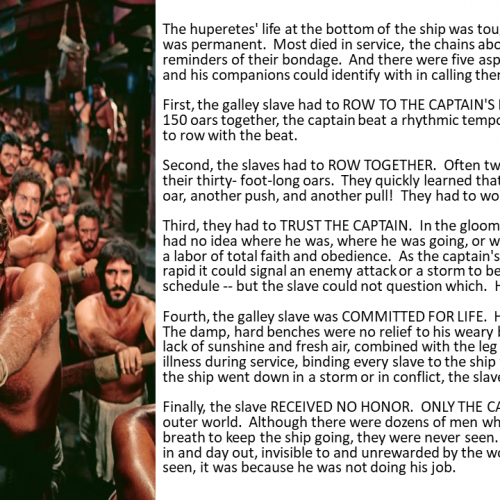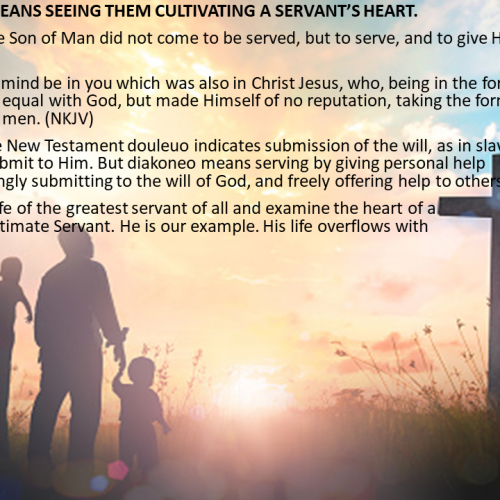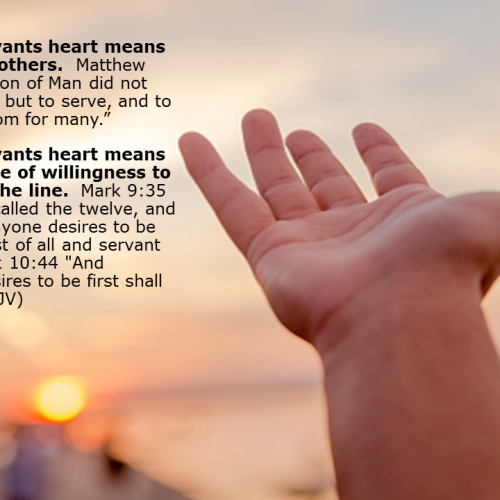If the YouTube video above is not available, here are two other ways to view:
How To Be A Servant At Heart
020728AM Prayer-6 GDGW-24
Growing Dads God’s Way-24
The Most Powerful Tools in
Godly Parenting: Prayer – 6
PRAYING FOR
SERVANT HEARTED CHILDREN
DWM-17 WFF-24 WFP-19
May I give you a little quiz this morning? If you know the answers just say it right out like we were sitting in my living room at one of the many home Bible Studies Bonnie and I have led over these years. Here we go:
- Jesus said, I did not come to be served but to ____________. (serve)
- And the last shall be ______ (first).
- I did not come to do my own ____ (will).
The greatest goal we have spiritually as parents is to raise children that are useful to God. Usefulness in Christ’s kingdom is defined by one very precious quality – SERVANTHOOD. The words servants and servants and bondservants are used over 1000 times in the New Testament, that is about once every seven verses. That is very frequent! We are to be Christ’s servants, and He is called a servant.
- Acts 3:13 The God of Abraham, Isaac, and Jacob, the God of our fathers, glorified His Servant Jesus, whom you delivered up and denied in the presence of Pilate, when he was determined to let Him go.
- Acts 3:26 To you first, God, having raised up His Servant Jesus, sent Him to bless you, in turning away every one of you from your iniquities.”
- Acts 4:27 “For truly against Your holy Servant Jesus, whom You anointed, both Herod and Pontius Pilate, with the Gentiles and the people of Israel, were gathered together
- Acts 4:30 by stretching out Your hand to heal, and that signs and wonders may be done through the name of Your holy Servant Jesus.”
- Revelation 22:3 And there shall be no more curse, but the throne of God and of the Lamb shall be in it, and His servants shall serve Him.
It has been estimated by historians that at the time of Paul there were as many as 60 million slaves owned by masters in the Roman Empire. So slaves and slavery were well known themes to the New Testament world. That is why Paul’s testimony to the church at Corinth is so powerful. They knew what he meant when he declared that he and his companions wanted to be regarded as “servants”. Let’s turn to I Corinthians 4:1. The word servant in this verse communicated a vision of humility and absolute servility.
The word in the original language was HUPERETES, literally “under rowers.” That hardly means anything to us. But for the Corinthians of the first century it was a loathsome term. Corinth sat astride the isthmus that joined the southern peninsula to mainland Greece. In Paul’s time it was the wealthiest and most prominent of all Greek cities.
One of the most common sights to the people of Corinth was the ship tramway that moved vessels overland to the opposite shore. Like the Panama Canal today, that overland transport system was in constant use and saved days of travel time for all who used it.
The most numerous boats were the triremes or galley slave ships, each with three banks of oars in three levels, one above another. The slaves who sat chained to the bottom oars were called HUPERETES, the “under rowers”.
LIFE AT THE BOTTOM OF THE SHIP
 The huperetes’ life at the bottom of the ship was tough and always busy — and it was permanent. Most died in service, the chains about their ankles grim reminders of their bondage. And there were five aspects of their work that Paul and his companions could identify with in calling themselves “servants” of Christ.
The huperetes’ life at the bottom of the ship was tough and always busy — and it was permanent. Most died in service, the chains about their ankles grim reminders of their bondage. And there were five aspects of their work that Paul and his companions could identify with in calling themselves “servants” of Christ.
- First, the galley slave had to ROW TO THE CAPTAIN’S BEAT. To keep as many as 150 oars together, the captain beat a rhythmic tempo on a drum. Each slave had to row with the beat.
- Second, the slaves had to ROW TOGETHER. Often two or three rowers moved their thirty- foot-long oars. They quickly learned that one could not lean on the oar, another push, and another pull! They had to work as a team.
- Third, they had to TRUST THE CAPTAIN. In the gloomy depths of the boat a slave had no idea where he was, where he was going, or when he would arrive. His was a labor of total faith and obedience. As the captain’s beat grew more and more rapid it could signal an enemy attack or a storm to be avoided or a hurried schedule — but the slave could not question which. He could only obey.
- Fourth, the galley slave was COMMITTED FOR LIFE. His was always a one-way trip. The damp, hard benches were no relief to his weary bones after a day’s labor. The lack of sunshine and fresh air, combined with the leg chains, meant repeated illness during service, binding every slave to the ship with deadly certainty. And if the ship went down in a storm or in conflict, the slaves had no way of escape.
- Finally, the slave RECEIVED NO HONOR. ONLY THE CAPTAIN WAS VISIBLE to the outer world. Although there were dozens of men who gave their lives and very breath to keep the ship going, they were never seen. They rowed on and on, day in and day out, invisible to and unrewarded by the world. If an under rower were seen, it was because he was not doing his job.
So what was Paul’s goal in his life? To be Christ’s servant. What should be our personal goal? The same. WE MUST BECOME BY HABIT, LIKE THOSE GALLEY SLAVES OR UNDER-ROWERS FOR CHRIST! And our prayer for our children? No less. Read ! Corinthians 4.1 and pray.
Prayer is the key to raising, nurturing, and launching children that please the Lord is learning how to pray for our children.
WE MUST PRAY FOR REALITY IN THEIR SPIRITUAL LIFE:
- SPIRITUAL REALITY MEANS SEEING THEM GENUINELY SAVED.
- SPIRITUAL REALITY MEANS SEEING THEM LOVING GOD’S WORD.
- SPIRITUAL REALITY MEANS SEEING THEM LIVING IN VICTORY.
- SPIRITUAL REALITY MEANS SEEING THEM THINKING OF HEAVEN.
- SPIRITUAL REALITY MEANS SEEING THEM FINDING SIN REPULSIVE.
- SPIRITUAL REALITY MEANS SEEING THEM STAY TENDER TOWARD GOD.
WE MUST PRAY FOR INTEGRITY IN THEIR PERSONAL LIFE:
- PERSONAL INTEGRITY MEANS SEEING THEM MAINTAINING A CLEAR CONSCIENCE.
- PERSONAL INTEGRITY MEANS SEEING THEM LEARNING TO STAND ALONE (which means a conviction that their character is more important than their popularity).
- PERSONAL INTEGRITY MEANS SEEING THEM SEEKING TO STAY PURE.
- PERSONAL INTEGRITY MEANS SEEING THEM CULTIVATING A SERVANT’S HEART.
- Mark 10:45 “For even the Son of Man did not come to be served, but to serve, and to give His life a ransom for many.” (NKJV)
- Philippians 2:5-7 Let this mind be in you which was also in Christ Jesus, who, being in the form of God, did not consider it robbery to be equal with God, but made Himself of no reputation, taking the form of a bondservant, and coming in the likeness of men. (NKJV)
 Servant and Slave. In the New Testament douleuo indicates submission of the will, as in slavery. We Christians are slaves of Jesus, for we submit to Him. But diakoneo means serving by giving personal help to another. Christian servanthood means willingly submitting to the will of God, and freely offering help to others.[1]
Servant and Slave. In the New Testament douleuo indicates submission of the will, as in slavery. We Christians are slaves of Jesus, for we submit to Him. But diakoneo means serving by giving personal help to another. Christian servanthood means willingly submitting to the will of God, and freely offering help to others.[1]
Now lets look into the Life of the greatest servant of all and examine the heart of a servant. Jesus was the Ultimate Servant. He is our example. His life overflows with servant heartedness.
- Cultivating a servant’s heart means praying for God’s ruling over each of my days. Matthew 6:10 Your kingdom come. Your will be done On earth as [it is] in heaven. (NKJV) Which shows salvation Matthew 7:21 ” Not everyone who says to Me, ‘Lord, Lord,’ shall enter the kingdom of heaven, but he who does the will of My Father in heaven. (NKJV) Which shows relationship Matthew 12:50 “For whoever does the will of My Father in heaven is My brother and sister and mother.” (NKJV)
- Cultivating a servant’s heart means staying loyal to the Lord as their master. This kind of heart is EXCLUSIVE, its Him first or nothing! Matthew 6:24 “No one can serve two masters; for either he will hate the one and love the other, or else he will be loyal to the one and despise the other. You cannot serve God and mammon.” (NKJV) Luke 16:13 “No servant can serve two masters; for either he will hate the one and love the other, or else he will be loyal to the one and despise the other. You cannot serve God and mammon.” (NKJV) James 4:4-5 Ye adulterers and adulteresses, know ye not that the friendship of the world is enmity with God? whosoever therefore will be a friend of the world is the enemy of God. 5 Do ye think that the scripture saith in vain, The spirit that dwelleth in us lusteth to envy? (KJV)
- Cultivating a servant’s heart means seeking to serve others. Matthew 20:28 just as the Son of Man did not come to be served, but to serve, and to give His life a ransom for many.”
- Cultivating a servant’s heart means a growing attitude of willingness to go to the end of the line. Mark 9:35 And He sat down, called the twelve, and said to them, “If anyone desires to be first, he shall be last of all and servant of all.” (NKJV) Mark 10:44 “And whoever of you desires to be first shall be slave of all. (NKJV)
- Cultivating a servant’s heart means following Christ’s example daily. Luke 9:23 Then He said to [them] all, “If anyone desires to come after Me, let him deny himself, and take up his cross daily, and follow Me. (NKJV) Luke 14:27 “And whoever does not bear his cross and come after Me cannot be My disciple. (NKJV)
- Cultivating a servant’s heart means seeking to do God’s will. John 5:30 I can of mine own self do nothing: as I hear, I judge: and my judgment is just; because I seek not mine own will, but the will of the Father which hath sent me. (KJV)
- Cultivating a servant’s heart means not being a people pleaser but a God pleaser. Galatians 1:10 For do I now persuade men, or God? Or do I seek to please men? For if I still pleased men, I would not be a bondservant of Christ.
- Cultivating a servant’s heart means seeking to deny my selfish desires. Philippians 2:7-11 but made Himself of no reputation, taking the form of a bondservant, [and] coming in the likeness of men. 8 And being found in appearance as a man, He humbled Himself and became obedient to [the point of] death, even the death of the cross. (NKJV)
- Cultivating a servant’s heart means staying in touch at all times with your Master. Colossians 4:12 Epaphras, who is one of you, a bondservant of Christ, greets you, always laboring fervently for you in prayers, that you may stand perfect and complete in all the will of God.
- Cultivating a servant’s heart means not being argumentative and pushy. 2 Timothy 2:24 And a servant of the Lord must not quarrel but be gentle to all, able to teach, patient, In a practical sense, patience is the ability to remember good and forget evil. You don’t keep a record of wrongs people have committed against you (cf. 1 Cor. 13:5).[2]
- Cultivating a servant’s heart means delighting in doing the will of God. Hebrews 10:5-7 Therefore, when He came into the world, He said: “Sacrifice and offering You did not desire, But a body You have prepared for Me. 6 In burnt offerings and [sacrifices] for sin You had no pleasure. 7 Then I said, ‘Behold, I have come — In the volume of the book it is written of Me — To do Your will, O God.’ ” (NKJV) Psalm 40:6-8 Sacrifice and offering You did not desire; My ears You have opened. Burnt offering and sin offering You did not require. 7 Then I said, “Behold, I come; In the scroll of the book [it is] written of me. 8 I delight to do Your will, O my God, And Your law [is] within my heart.” (NKJV)
- Cultivating a servant’s heart means willing to suffer for God’s Glory. 1 Peter 2:21 For even hereunto were ye called: because Christ also suffered for us, leaving us an example, that ye should follow his steps: (KJV)
With a few strokes of a pen on parchment, Paul painted a portrait that was horridly vivid for his readers. And he said it was a portrait of himself and his companions in ministry. Paul wanted to be known and remembered for five things:
- That he rowed to the Captain’s beat and so was SUBMISSIVE;
- That he worked in harmony with those about him and so was SENSITIVE;
- That he didn’t care where he labored for the Captain, and so was TRUSTING;
- That he would die at his post, and so was DEDICATED;
- And that he wanted none of the glory to go to himself, but all to the Captain, and so was HUMBLE.
 Our motivation for serving Christ differs from those ancient galley slaves, of course, even if our situation is similar. Like galley slaves, we need to obey our Master, cooperate with our fellow servants, and trust the Lord to take us where we need to go, remain in service for a lifetime, and give Christ all the glory.
Our motivation for serving Christ differs from those ancient galley slaves, of course, even if our situation is similar. Like galley slaves, we need to obey our Master, cooperate with our fellow servants, and trust the Lord to take us where we need to go, remain in service for a lifetime, and give Christ all the glory.
- But while galley slaves did these things out of fear, we can do them in confident trust in a loving Captain whose plans for us are good. “‘For I know the plans I have for you,’ declares the Lord, ‘plans to prosper you and not to harm you, plans to give you hope and a future'” (Jer. 29:11)
- Like galley slaves, we belong to someone else. “You are not your own,” wrote Paul; “you were bought at a price” (I Cor. 6:19c,20a).
- But while iron chains held them, we are held in Christ’s service by a different kind of chain: “For Christ’s love compels us…” (2 Cor. 5:14).
So, the piercing examination that must be done this morning is — are we living our life each day as bondservants of Christ?
Are you truly SUBMISSIVE, rowing to the beat of your Captain?
- Saying with Jesus Matthew 26:39 “Not my will but Thine be done”;
- Presenting your self to Him today as a living sacrifice Romans 12:1-2
- HOW? By being in the Word! By Needing the Word!
Are you SENSITIVE pulling together with your fellow servants in Christ?
- “Look not every man on his own things but on the things of others” Philippians 2:4
- “Others’ Booth;
- HOW? By being regularly, faithfully, weekly, committedly in the Assembly with the saints! Hebrews 10:24-25. By Needing the Saints!
Are you truly TRUSTING Christ so you willingly go wherever He leads?
- Psalm 48:14 For this [is] God, Our God forever and ever; He will be our guide [Even] to death. (NKJV)
- John 15:5 “I am the vine, you [are] the branches. He who abides in Me, and I in him, bears much fruit; for without Me you can do nothing. (NKJV)
- HOW? By being in a Christ dependence relationship to Jesus! You know what chemical dependence is, the cigarette, bottle, needle or pill. The craving and total focus. That is what Jesus wants in a positive spiritual relationship! By Needing the Lord!
Are you truly DEDICATED as one committed to Him for life?
- “I have finished the course” Paul said in II Timothy 4:7
- “I do always things that please the Father” Jesus said in John 8:29
- HOW? By being marked as belonging to Him! Citizens of Heaven as Paul said in Philippians 3:20. By Needing His Well Done good and Faithful servant!
And are you truly HUMBLE making sure to take none of the glory but to pass it all on to Him?
- The Psalmist [115:1] cried “not unto us, not unto us, but to Your name give glory
- God calls Himself a Jealous God no less than 9x in the OT. Deuteronomy 4:24 “For the LORD your God [is] a consuming fire, a jealous God. (NKJV). He also says He is jealous over His people at least 4x.
- HOW? By Needing only God to get all the GLORY!
That what we are to be this morning.
Song
#368 All for Jesus
#371 Have Thine own Way
[1]Richards, Lawrence O., The Teacher’s Commentary, (Wheaton, IL: Victor Books) 1987.
[2]MacArthur, John, Jr., The Master’s Plan for the Church, (Chicago: Moody Press) 1998.
Slides
Check Out All The Sermons In The Series
You can find all the sermons and short clips from this series, Delights of a Word-Filled Marriage here.
Looking To Study The Bible Like Dr. Barnett?
Dr. Barnett has curated an Amazon page with a large collection of resources he uses in his study of God’s Word. You can check it out here.




